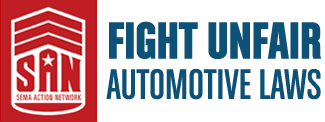Don't know if this impacts anyone here, and didn't find anything from searching....
Oregon Introduces Bill to Prohibit Sale of Aftermarket Parts
At the request of Governor Theodore Kulongoski, the Oregon Speaker of the House has introduced legislation (H.B. 2186) to prohibit the sale and distribution of aftermarket motor vehicle parts if alternatives are available that “decrease greenhouse gas emissions from motor vehicles.” The bill is primarily focused on aftermarket tires and would authorize the Environmental Quality Commission to implement enforcement regulations, likely based on a rolling resistance calculation.
We Urge You to Contact Oregon Speaker of the House Dave Hunt and Members of the Environment and Water Committee (Contact Information Below) Immediately to Request Their Opposition to H.B. 2186
* H.B. 2186 would regulate vehicle fuel economy, an authority reserved to the federal government.
* H.B. 2186 could ban tires that may have improved performance, handling or appearance features, based solely on a rolling resistance rating. In addition, this program could easily distract consumers from focusing on more important safety issues such as tire inflation and overloading of vehicles.
* H.B. 2186 would force consumers to purchase only original equipment manufacturer (OEM) tires because the program essentially exempts OEM-selected tires and unfairly implies that they are superior to aftermarket products.
* H.B. 2186 could prohibit aftermarket parts designed to either personalize or optimize specific vehicle performance attributes including handling, towing, suspension, fuel economy, etc.
* H.B. 2186 provides broad authority to government regulators and could limit a range of aftermarket parts currently available to consumers based on the subjective determination of government regulators.
At the request of Governor Theodore Kulongoski, the Oregon Speaker of the House has introduced legislation (H.B. 2186) to prohibit the sale and distribution of aftermarket motor vehicle parts if alternatives are available that “decrease greenhouse gas emissions from motor vehicles.” The bill is primarily focused on aftermarket tires and would authorize the Environmental Quality Commission to implement enforcement regulations, likely based on a rolling resistance calculation.
We Urge You to Contact Oregon Speaker of the House Dave Hunt and Members of the Environment and Water Committee (Contact Information Below) Immediately to Request Their Opposition to H.B. 2186
* H.B. 2186 would regulate vehicle fuel economy, an authority reserved to the federal government.
* H.B. 2186 could ban tires that may have improved performance, handling or appearance features, based solely on a rolling resistance rating. In addition, this program could easily distract consumers from focusing on more important safety issues such as tire inflation and overloading of vehicles.
* H.B. 2186 would force consumers to purchase only original equipment manufacturer (OEM) tires because the program essentially exempts OEM-selected tires and unfairly implies that they are superior to aftermarket products.
* H.B. 2186 could prohibit aftermarket parts designed to either personalize or optimize specific vehicle performance attributes including handling, towing, suspension, fuel economy, etc.
* H.B. 2186 provides broad authority to government regulators and could limit a range of aftermarket parts currently available to consumers based on the subjective determination of government regulators.








Comment